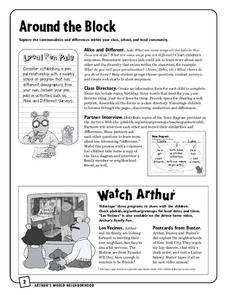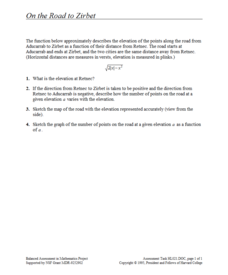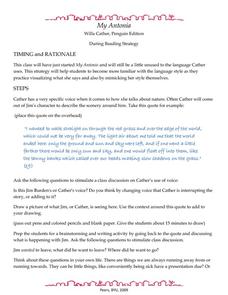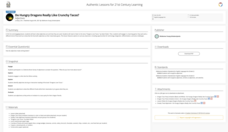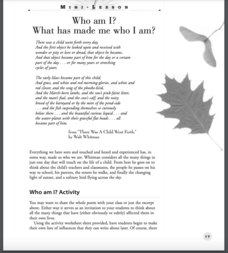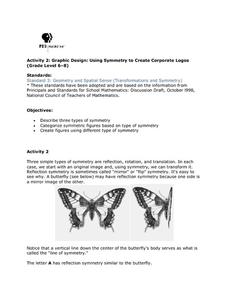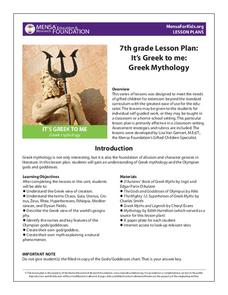K12 Reader
Adjectives Describe
Vivid writers all start out the same way: learning in elementary school how to use a variety of adjectives! Young grammarians add adjectives to eight fill-in-the-blank sentences.
Constitutional Rights Foundation
Ellis Island—The “Golden Door” to America
Are you one of the 100 million Americans whose ancestors passed through the doors of Ellis Island? Learn about the historic entry point for immigrants in the late 19th and early 20th centuries with an informative reading passage. After...
Curated OER
Tunes for Bears to Dance to: Vocabulary Strategy
To prepare for a reading of Robert Cormier's Tunes for Bears to Dance to, kids research vocabulary drawn from the novel and share their findings with their groups.
PBS
Around the Block
Arthur and his friends help children explore the concepts of family, community, and diversity in a fun series of activities. From performing peer interviews to mapping out the different places learners have lived or visited, this...
Concord Consortium
On the Road to Zirbet
The road to a greater knowledge of functions lies in the informative resource. Young mathematicians first graph a square root function in a short performance task. They then use given descriptions of towns and the key features of the...
Flipped Math
Sequences
Develop a sequence of descriptions. Learners watch an introduction to sequences, their notations, and how to graph them. Pupils use full sentences to describe the sequence and how to get from one term to the next, without needing to...
Curated OER
My Antonia: During Reading Strategy
Home in on the quote on this page to explore setting, the author's and character's voices, and plot in Willa Cather's My Antonia. Pupils draw a picture of what is described in the quote, discuss the content, and make connections to their...
University of Nottingham
Drawing to Scale: A Garden
See how design and geometry go hand in hand. The activity asks learners to use geometry to design a backyard garden given dimensions of each feature. Scholars work with ratios and scale to develop an accurate scale drawing that includes...
Columbus City Schools
History Helps When It Comes To Plate Tectonics
Get ready to move, shake, slip, and slide with a well-rounded plate tectonics unit! The engaging resource includes everything you need to inspire eighth grade science scholars, from worksheets to demonstrations. Assess their...
Education Outside
Fruits vs. Veggies
Fruit or vegetable? That is the question in this activity designed for first graders. After a brief explanation of the difference, kids select two plants, use two words to describe each one, label them as a fruits or vegetables, and...
Balanced Assessment
Toilet Graph
Mathematics can model just about anything—so why not simulate the height of water in a toilet bowl? The lesson asks pupils to create a graphical model to describe the relationship of the height of the water as it empties and fills again....
Biology Junction
Bioenergetics
Bioenergetics strives to describe how living things gain and transform energy for biological purposes. First, pupils learn about the types of energy before exploring the importance of energy in biological processes. Next, they discover...
EngageNY
Building Background Knowledge: The Internment of Japanese-Americans during WWII, Part 1
It is all in the details. Scholars read The Life of Miné Okubo and pay special attention to details that reveal Okubo's character. Completing their Understanding Miné: Character Traits graphic organizers and recalling the descriptions...
British Council
Reading House
Scholars work in pairs to describe their homes and draw a picture of their partner's home. Next, individuals discuss their ideal home in small groups and follow up their discussion with a written description.
K20 LEARN
Do Hungry Dragons Really Like Crunchy Tacos?: Adjectives
Tacos are the theme of a lesson all about adjectives. Scholars list as many adjectives as possible to describe tacos and play a game of Not Like the Others before reading Dragons Love Tacos by Adam Rubin. Peers guess their favorite foods...
Scholastic
Who Am I? What Has Made Me Who I Am?
"Everything we have seen and touched and heard and experienced has, in some way, made us who we are." Your young learners will use this resource to create lists of influences (people, animal, nature, places, etc.) in their lives and to...
Smithsonian Institution
Voices of Bull Run
Soldier's lives are often a topic when studying the Civil War, but what about the lives of civilians? Scholars use the characters from the novel Bull Run to better understand the lives of those not directly on the Civil War battlefields....
Shell Education
A Tribute To Dr. Martin Luther King Jr.
How much do your learners know about Dr. Martin Luther King Jr.? Set up an opportunity for kids to learn about Dr. King while practicing reading fluency with a reader's theater activity. The script is for four voices and includes...
National Wildlife Federation
Tree Detectives!
Trees may look pretty similar until you take a closer look. Young scientists use their observation skills to describe the difference between the bark, leaves, and seeds of different trees. They then use a field guide to identify local...
PBS
Using Symmetry to Create Corporate Logos
Young mathematicians investigate the use of symmetry in graphic design. After first learning about reflection, translational, and rotational symmetry, children use this new knowledge to identify symmetry in letters of the alphabet and...
Math Solutions
Dr. Seuss Comes to Middle School Math Class
If you think Dr. Seuss has no place in a math classroom, then take a look at this resource. Based on the classic children's book Green Eggs and Ham, this sequence of activities engages children learning to model real-world contexts with...
Curated OER
It’s Greek to Me: Greek Mythology
Here you'll find a great collection of worksheets to supplement your instruction of Greek mythology, including informational texts on the Olympian gods and goddesses, a matching quiz, graphic organizers, and myth-writing activities.
University of Georgia
Using Freezing-Point Depression to Find Molecular Weight
Explore the mathematical relationship between a solvent and solute. Learners use technology to measure the cooling patterns of a solvent with varying concentrations of solute. Through an analysis of the data, pupils realize that the rate...
EngageNY
Using Sample Data to Compare the Means of Two or More Populations II
The 23rd segment in a series of 25 presents random samples from two populations to determine whether there is a difference. Groups determine whether they believe there is a difference between the two populations and later use an...
Other popular searches
- Words to Describe People
- Precise Adjectives to Describe
- Writing to Describe
- Words to Describe Location
- Describe How to Get to Safety
- Words to Describe the Past





